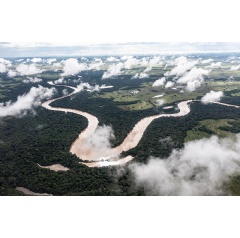WWF in 2024: A year of conservation action
WWF’s Annual Review 2024 highlights our ongoing efforts to bring hope for the future of people and nature.

In WWF’s global review of the past year, WWF International Director General Kirsten Schuijt explains that, despite the exceptionally serious global crises of nature loss and climate change, now is not the time for despair: “After over 60 years of relentless effort on behalf of people and nature, WWF still stands strong alongside our many partners and supporters around the world.”
2024 saw significant strides forward in many of the 100+ countries where we are active − here are just a few examples of the progress we are making around the world:
- Building strong partnerships with Indigenous Peoples and local communities – since 2020, for example, our Coastal Communities Initiative has supported their leadership in coastal conservation across 29 countries.
- Working with partners to support the 49 countries (plus the EU) committed to the Freshwater Challenge – a global initiative to restore 300,000km of rivers and 350 million hectares of wetlands.
- Helping 16 countries in North Africa to implement the UN Kunming-Montreal Global Biodiversity Framework, the global blueprint for protecting and restoring nature.
- Working in partnership to support vulnerable communities and ecosystems in 20 countries through nature-based solutions for climate change adaptation and disaster risk reduction.
- Supporting cities to develop climate action plans through our One Planet City Challenge, with more than 150 cities now aligning targets with keeping global warming below 1.5°C.
Alongside this positive news, there have, however, been serious setbacks over the past 12 months in key global decision-making bodies such as the UN biodiversity and climate conferences.
Kirsten Schuijt says: “For too long humanity has been taking two entirely contradictory paths: on the one hand, making powerful commitments on nature loss and climate change; on the other, not taking the urgent action so desperately needed.
“With natural systems now nearing breakdown, this befuddled approach is no longer tenable. We need ambition and action, not sterile thinking and inertia. We need to embark on a new journey toward urgent systemic change.”
Roadmap 2030
Looking forward, Kirsten Schuijt explains how, over the next five years, WWF will help lead the way through Roadmap 2030, which will bring our global network together around tackling the most urgent global conservation challenges.
Due for launch in early 2025, Roadmap 2030 will require us not only to refocus some of what we do but also to change the way we do things, including continuing our shift toward inclusive conservation.
“This means placing people at the centre of our work, supporting Indigenous Peoples and local communities to protect their lands and biodiversity, and ensuring that frequently-marginalized groups, including young people and women, are central to conservation decisions that impact their lives.
“It is essential for WWF to be a constant source of positivity, courage and determination if we are to see the action and impact so urgently needed to build a better future for people and planet.
“By unifying around Roadmap 2030, we commit to acting collectively and decisively with others; to endeavour to be the best at what we do; and to focus like never before on delivering measurable conservation impact in the places our founders set out to conserve 63 years ago.”
( Press Release Image: https://photos.webwire.com/prmedia/7/334901/334901-1.jpg )
WebWireID334901
This news content was configured by WebWire editorial staff. Linking is permitted.
News Release Distribution and Press Release Distribution Services Provided by WebWire.